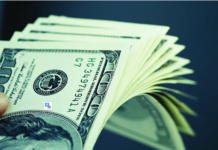
Govt allocates around Tk7,000cr from Energy Security Fund without guideline
The government is using money from the Energy Security Fund to manage and plan for gas deficiency in the future.
In the past, they were facing difficulty to gather funding to meet import costs of 1,000 Million Cubic Feet per Day (mmcfd) of liquefied natural gas (LNG) and to operate two LNG terminals.
The price of imported LNG will be three times higher than natural gas that is extracted locally. At present LNG is set to be added to the national gas grid from May 2018.
The state-owned oil company, Petrobangla is set to import LNG from different countries and distribute it to consumers through subsidiary companies.
However, Bangladesh Energy Regulatory Commission (BERC) has allocated approximately Tk7,000 crore for one year to Energy and Mineral Resources Division from its Energy Security Fund for the purposes of LNG import and operations of LNG terminals.
It has been two years since the Energy Security Fund was formed and the cash is set to be disbursed without any guidelines.
On September 2015, BERC created the fund through a hike in gas prices for research work on developing the energy sector.
As per draft guidelines, for the sale of each cubic metre of gas, Tk1.01 is stored in the special fund. The interest on the savings will also be kept in the fund along with the surcharge and profit on the fund money.
The Security Fund received around Tk3,552.65 crore as of March 2017.
The government is expecting the first consignment of 500 mmcfd (million cubic feet per day) LNG by May next year and another 500 mmcfd LNG is set to be imported by November 2018.
When asked, BERC Chairman Monowar Islam said to Dhaka Tribune, the finalisation of guidelines is in its final stage and will be completed soon.
He declined to comment when asked why the fund was allocated without any guidelines.
Why LNG Import
Petrobangla officials say a gas shortage still exists in Bangladesh, with a daily average output of 2,700 mmcfd and a demand of 3,500 mmcfd of gas.
While the demand for gas has increased, no gas field, either offshore or onshore, has been discovered in the past two years. This is why the government planned to import LNG to meet gas demands in 2010.
The latest onshore gas field was discovered in 2014 at Rupganj in Narayanganj.
From where will LNG be imported
Petrobangla will reportedly import LNG from Qatar, Oman and Switzerland to add to the national gas grid.
Earlier, Petrobangla signed two separate deals with two firms in an effort to cover floating storages and install re-gasification units (FSRU), popularly known as Liquefied Natural Gas Terminal. It is a first of its kind in the country and situated at Moheshkhali Island in the Bay of Bengal.
The deals were signed with the US firm Excelerate Energy and local conglomerate Summit Group, under the Speedy Supply of Power and Energy (Special Provision) Act 2010.
LNG import will impact the gas price in the country. The move will increase the expenditure in the industry and commercial sector as the cost of electricity generation will be increased
According to the terms and conditions, Petrobangla will pay the firms for using FSRU under a build-own-operate-transfer basis for 15 years.
On the other hand, State-owned Gas Transmission Company Ltd (GTCL), a Petrobangla company, installed a 91km Moheshkhali-Anwara gas transmission pipeline to carry re-gasified LNG from the terminal to the shore.
Another gas transmission pipeline of GTCL is currently under construction and is being set up to supply imported LNG to the LNG terminal.
Government undecided about LNG consumer price
The government is yet to decide which stakeholders, among the fertiliser sector, industry sector, commercial sector, power sector, CNG sector or household can consume the imported LNG.
Selling price of the imported LNG has not been set for the consumers yet.
A Petrobangla official said the imported LNG is likely to be sold to the consumers of Chittagong region by State-run Karnaphuli Gas Distribution Company Limited under supervision of Petrobangla.
He also said: “We think we will carry on our initiatives to increase electricity generation capacity by supplying LNG to power plants which closed down for lack of gas supply.”
Imported LNG higher than the price of domestic natural gas
The price of imported LNG will be higher than the price of natural gas extracted in Bangladesh. The government plans to start supplying LNG to industrial and commercial units on a priority basis after the import.
The price of LNG is connected to the price of oil internationally. That means, if the price of oil increases or decreases, it has a direct impact on the price of LNG.
In recent times, the price of oil has drastically fallen and the market price is expected to remain low for the foreseeable future.
A Petrobangla official who wished to remain anonymous has indicated the price of imported LNG will remain under $7 per mmbtu which is the equivalent of one million British thermal unit and around three times higher than the price of gas in Bangladesh.
The official said if the price remains $7 per mmbtu then price of gas per cubic meter will be Tk19.78.
He said if the selling price per cubic meter of LNG stands, then after including supplementary duty (SD) and value added tax (VAT), the price will be Tk62.15. This also includes customs duty and advance income tax during importing.
The official further explained, after imposing SD and VAT on 2700 mmcfd of local gas and 1000 mmcfd of imported gas, the mixed price of LNG will stand at Tk23.26 per cubic meter. On the other hand, if all the taxes were cancelled, as in minus the 15% VAT when selling, the price per cubic meter will stand at Tk11.15.
At present Bangladesh’s per cubic meter weighted average price for all sectors is Tk7.35 per cubic meter.
The Energy and Mineral Resources Division has recently presented a proposal for selling mixed gas at Tk11.75 per cubic meter reducing all the taxes except the 15% of VAT, to the Prime Minister (PM) Sheikh Hasina, under whom the Ministry of Power, Energy and Mineral Resources falls.
The PM has accepted the proposal.
Gas tariff hike again
Another Petrobangla official said: “the government has moved to raise gas tariff once again even before the start of LNG import from next year.”
Petrobangla has drafted a new tariff for gas which is scheduled to be implemented next year after the imported LNG enters the country.
As per the draft, the new weighted average price of gas per cubic meter will stand at Tk7.35 per cubic meter.
Prior to implementing this proposal, Petrobangla will have to submit the tariff to BERC.
According to BERC Act, the regulator will have to call a public hearing to help make a decision about increasing the tariff.
Abul Mansur Md Faizullah, Chairman of Petrobangla has said: “We are preparing a policy for using the imported LNG, which is yet to be finalised. Gas price will be slightly increased. We are holding discussions with various stakeholders to find out a way to adjust the price. Our hope is to make a decision quickly.”
Professor Ijaz Hossain of Bangladesh University of Engineering and Technology (BUET) said LNG import will impact the gas price in the country. He said the move will increase the expenditure in the industry and commercial sector as the cost of electricity generation will be increased.
Ijaz said: “It will also impact our society. The government should not be more dependent on imported LNG as a primary fuel.” He added it was ethically wrong for BERC “to allocate money from the Energy Security Fund for Energy and mineral Resources Division without preparing any guideline. I hope that the guideline will be implemented soon.”
Source: Dhaka Tribune.










